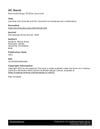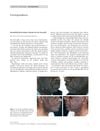
Search
for
Sort by
Research
120-150 / 1000+ results

research 200 Uncommon Finasteride Side Effects in Male Androgenic Alopecia

research Post-Finasteride Syndrome – Does It Really Exist?
Post-finasteride syndrome's existence is uncertain; more research needed.

research Low Dose Oral Minoxidil and the Conundrum of Cardiovascular Complications
Low dose oral minoxidil can help with hair growth but may cause serious heart problems, so doctors need to be careful.

research Philadelphia Dermatological Society
Dermatological conditions are complex and treatments often have mixed results.

research Finasteride
Finasteride effectively treats baldness but may cause sexual side effects.

research Thymosin Beta 4 Increases Hair Growth by Activation of Hair Follicle Stem Cells
Thymosin β4 promotes hair growth by activating stem cells in hair follicles.

research Local Heroes or Villains: Tissue-Resident Memory T Cells in Human Health and Disease
Tissue-resident memory T cells can protect against infections and cancer but may also contribute to autoimmune diseases.

research Black Dots Seen Under Trichoscopy Are Not Specific for Alopecia Areata
Black dots under trichoscopy can appear in different hair and scalp conditions, not just in alopecia areata.

research Research Brief: Self-Reports of Persistent Antiandrogenic, Estrogenic, Physical, and Psychological Effects of Finasteride Usage Among Men
Finasteride use can cause lasting negative effects like sexual dysfunction, depression, anxiety, and cognitive issues.

research TSPO Ligand Etifoxine Attenuates LPS-Induced Cognitive Dysfunction in Mice
Etifoxine, an anxiety drug, can lessen brain inflammation and cognitive issues in mice, partly by increasing production of protective brain steroids.

research Female Hair Loss: Assessment, Categorization, and Management
The document concludes that diagnosing female hair loss requires careful examination, with treatments varying by condition and psychological support often necessary.

research Contents Volume 231, 2015
The document covers various dermatological treatments and conditions.

research Combination and Rotational Therapy in Androgenetic Alopecia
Using different hair loss treatments at various times can improve results and reduce side effects for people with chronic hair loss.
research Comorbidities in Androgenetic Alopecia: A Comprehensive Review
Androgenetic alopecia is linked to heart disease, metabolic issues, and mental health problems.

research Comprehensive Analysis of LncRNA AC010789.1 Delays Androgenic Alopecia Progression by Targeting MicroRNA-21 and the Wnt/β-Catenin Signaling Pathway in Hair Follicle Stem Cells
The LncRNA AC010789.1 slows down hair loss by promoting hair follicle growth and interacting with miR-21 and the Wnt/β-catenin pathway.
research New-Onset Androgenic Alopecia Following Human Chorionic Gonadotropic Diet and Testosterone Pellet Implantation
The hCG diet and testosterone therapy can cause hair loss in some people.

research Androgens’ Effects Across the Lifespan in Men and Animal Models
Androgens, male hormones, affect physical and mental functions, with a decrease leading to health issues like muscle loss, bone disease, and depression, and more research is needed on long-term effects and treatments.

research Re-Densification Effect of Pressure-Injected Peptide-Hyaluronic Acid Combination on Male Androgenic Alopecia
Injecting a peptide-hyaluronic acid mix improved hair growth in men with hair loss and was safe.

research Black Hairy Tongue: A Case Report
Improving oral hygiene and quitting smoking can resolve black hairy tongue.

research Efficacy and Safety of Diphenylcyclopropenone Alone or in Combination with Anthralin in the Treatment of Chronic Extensive Alopecia Areata: A Retrospective Case Series
Combining diphenylcyclopropenone with anthralin is more effective for hair regrowth in alopecia areata than using diphenylcyclopropenone alone, but may cause more side effects.

research Biologic: A Double-Edged Sword - A Case of Etanercept-Induced Alopecia Areata in a Patient with Psoriasis Vulgaris
Etanercept, a psoriasis treatment, caused hair loss in a patient.
research A Comprehensive Literature Review of JAK Inhibitors in the Treatment of Alopecia Areata
JAK inhibitors show promise in effectively treating hair loss from alopecia areata.

research Hair Loss in Children: A Detailed Overview of Pediatric Alopecia
The most common cause of hair loss in children is tinea capitis, followed by alopecia areata and telogen effluvium.

research Infliximab-Associated Psoriasiform Alopecia
Stopping infliximab and using strong topical steroids can regrow hair lost due to psoriasiform alopecia.

research Pseudofolliculitis Barbae Induced by Oral Minoxidil
Oral minoxidil can cause inflamed, ingrown hairs in the beard area.

research Systemic Causes of Hair Loss
The article concludes that correctly diagnosing systemic causes of hair loss requires a detailed clinical evaluation and a systematic diagnostic approach.

research Dermatologic Signs and Symptoms of Substance Abuse
Substance abuse can cause various skin problems, including marks from injections, sores, premature aging, and increased cancer risk.

research From Evidence to Practice: Insights from the Multidisciplinary Team on the Optimal Integration of GLP-1 Receptor Agonists in Obesity Management Services
GLP-1 receptor agonists help with weight loss but need to be combined with other treatments for best results.

research Managing the Hair and Skin of African American Pediatric Patients
The document emphasizes the need for primary care providers to understand and care for African American children's hair and skin to boost their self-esteem.